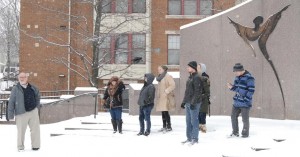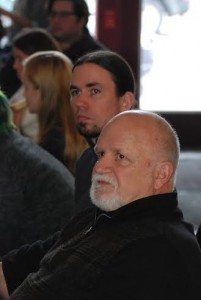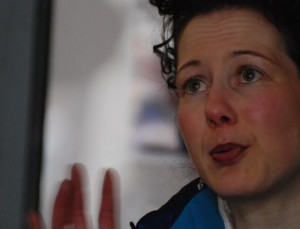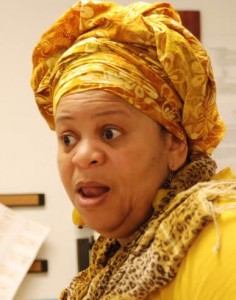
John Durst limped slowly through snow, slush and rain determined that nothing was going to interrupt a trip to hilly Pittsburgh with students and faculty studying social justice issues.
At one point, Durst, associate professor of sociology at Ohio Wesleyan University, ignored doctor’s orders not to walk without the plastic, open-toe boot supporting his fractured left ankle because he wanted to keep up and, frankly, he got tired of having a wet, cold foot.
The Feb. 20-22 trip was part of the Poverty, Equity and Social Justice (PESJ) Course Connection program. Seven students and three faculty members, across a variety of disciplines including sociology, psychology, journalism, and women’s and gender studies, ventured to the traditional Rust Belt city to examine issues of racial conflict, gentrification and entrepreneurship.

“We wanted to offer students an opportunity to go see something,” said Durst, who is the coordinator for the PESJ course connection.
Durst also said part of the course connection’s strong suit is that it gives different faculty members a chance to get to know each other and explore difficult issues from various viewpoints.
Celeta Hickman, a co-founder of the cooperative Ujamaa Ujamaa, seemed to have the most impact on the group as she explained how her neighborhood has changed as wealthy people move in, putting pressure on rent and housing costs.
Google Inc. recently announced it was building a 200,000 square foot, six-story office building near by. And while the expansion project has been touted as an economic boost for Pittsburgh, residents and businesses at the neighborhood level worry about both the short- and long-term impact for them.
“You have to understand that we have billionaires moving here, and we don’t know what to do about that,” said Hickman, who recently found out her shop’s rent will be raised $300 a month.
“People are fighting for their opportunity to shine in the sun,” she said. “African-American women [are] banding together to make it.”
The cooperative, which is in the city’s Hill District, sells pottery, body care items, clothing, jewelry and an assortment of other items. Most vendors are of African descent.
“It was really awesome,” senior Rizz Dickson said of the trip. “I liked seeing those parts of Pittsburgh because I’ve been to Pittsburgh a lot but I’ve never had a tour of it. I liked hearing from the local people.”

The group also met with Heather Fry, ’99, who recommended places worth visiting to Durst. She led a discussion at the Carson Street Deli in the Slopes neighborhood, within sight of downtown, but across one of the three rivers that weave through the city.
“I thought it was interesting to gain from her perspective because she went [to OWU] and she has been living in Pittsburgh for a long time,” said senior Ava Fiddle.
The group left its tracks in the snow at Freedom Corner, where “every meaningful march that has ever been” started there, Hickman said. On August 28, 1963, 2,000 people left for the March on Washington.

Other stops included the James Street Gastropub and Speakeasy, the Homewood-Brushton Center of the Community College of Allegheny County, Senator John Heinz History Center and The Andy Warhol Museum.
According to The Weather Channel, Pittsburgh received no more than one-half inch of snow while the OWU group was there, still, some places Durst planned visiting were closed.
“I think if anybody learned, I did,” said Durst in regards to the weather. He said he plans to have the trip in October next year.
“I wish we would’ve spent more time talking about solutions,” said senior Meredith Harrison. “I just felt like we saw a lot of the problems and a lot of people didn’t have answers when we were asking them about solutions.”
A grant from the Andrew W. Mellon Foundation funded the trip. The foundation, though based in New York City, was started in part by the accumulated wealth of the Mellon family of Pittsburgh.
Durst said the PESJ Course Connection will do its annual trip to Detroit in March to discuss similar issues.
